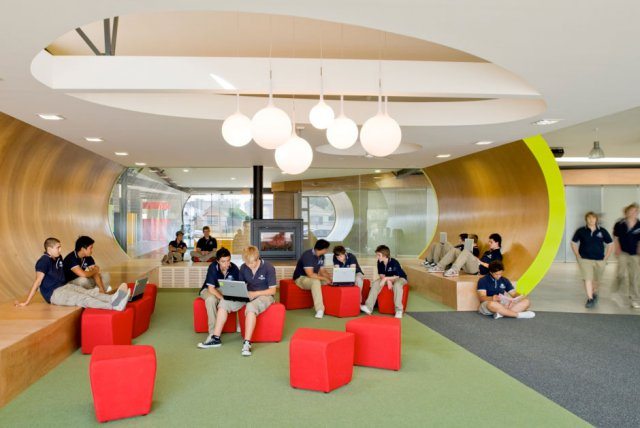Officials in charge of the Defense Department’s school system for military children are seeking input from parents, students and teachers in creating a 21st century learning environment by 2016.
The Department of Defense Education Activity, or DODEA, wants people who use the schools to provide their ideas on how to modernize education for the military schools of the future, right down to designing and furnishing them.
DODEA recently set up a three-phase plan for “Facilities for 21st Century Learning.” The first phase brought together industry, education and futurist experts. The second is the call for input, and the third will analyze the ideas, officials said.
“We are seeing dramatic changes in how students communicate, interact and learn,” the activity’s acting director, Marilee Fitzgerald, said in a recent DODEA news release.
Plans to renovate or build more than 100 schools through 2016 follow President Barack Obama’s “Strengthening Our Military Families” plan, which identifies education as a priority. Creating safe, secure and educationally appropriate school campuses for military children, DODEA officials said, is the primary goal.
“Good teachers can teach anywhere, but if the space they teach in is purposed for education, we can enhance the learning experience,” Fitzgerald said. “The facility shouldn’t be a barrier, or a workaround. It’s an intentioned space that is constructed for the benefit of learning.”
“We will eliminate our portables, we will eliminate multiple buildings,” Fitzgerald said. “We won’t have to take a journey around a base to get to the music room or to the art room.”
The goal is for future DODEA schools to be adaptive, flexible and capable, officials said, and innovative input from parents, teachers and students can help to make the goal a reality.
“You could say that we don’t know what we don’t know,” explained Mike Smiley, chief of facilities for DODEA. “Ten years ago, who expected Wi-Fi, smartphones and small tablets to be as prevalent as they are now? We do know that our schools of the future will need greater capability for connectivity, and we want to infuse our schools with information access.”
To make education adaptive for 21st century education, Smiley said, might mean that wall configurations will be easier to change, or that instructional spaces will have greater variability in size. Spaces may need to support one-on-one learning or small-group instruction, he added, leaving auditoriums for performances, lectures and presentations.
DODEA will take suggestions in education, curriculum delivery, use of technology, and the growing expectations for sustainability and energy conservation into consideration, Smiley said.
“[People] can submit in many different ways,” he added. “Submissions can be in the form of videos, images, written narratives or audio files.”
Methods of teaching face change, too, Smiley said, with an emphasis on becoming “student-centric,” rather than “teacher-centric.” “We need to better address individual students’ needs and maximize their potential,” he explained. “Our facilities should be designed to aid in this endeavor.”
While DODEA will not use a school prototype, Smiley said, he’d like to see something more challenging in a school setting for military children.
“We are really hoping for new ideas and innovation on how we can best design and build learning environments for our students,” he said.
Once input is gathered from parents, students, teachers and the communities, a process is in place to filter through the suggestions for the most viable ideas.
“We’ve hired an architectural and engineering firm with a lot of experience in school design to review the submissions,” Smiley said. “They’ll be looking for common or new themes in comparison with results of our earlier symposium that included subject-matter experts in a wide range of educational study.”
Parents and community members are invited to share ideas at http://21stcentury.dodea.edu/. DODEA also has an internal site for employees to submit ideas at http://intersect.hq.ds.dodea.edu/community/21stcenturyschools.
All student work, Smiley added, must be submitted by a teacher using the Intranet site.
DODEA consists of the Department of Defense Dependents Schools overseas, and the Department of Defense Domestic Dependent Elementary and Secondary Schools located in the United States and its territories and possessions. The activity provides education from pre-kindergarten through 12th grade to eligible children of Defense Department military and civilian personnel. DODEA also provides support and resources to local education activities throughout the United States that serve children of military families.










